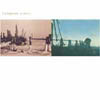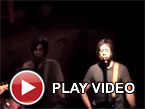F.S. Blumm, "Ankern"
Staubgold F.S. Blumm begins his second full-length album with measured, confidentguitar strumming and fretboard squeaks in a decidedly jazzy numbercalled "Folge." Despite the confidence, the song ends up feeling alittle hollow by the end, as if it never really reached the point whereit had intended to go, a disorientation which is symptomatic of thewhole album. Frank Schultge's polyinstrumental improvisations tend tomeander, sometimes aimlessly. The mood of 'Ankern' is largelyimprovisational, not directional or determined. F.S. Blumm createscompositions which rely on repeated melodic statements that change andflow into other statements. The repetitions between these statementsare like the sips of coffee between bites of morning toast (whole wheatwith the strawberry jam): moderately enjoyable and somewhat necessaryto drench the palette, but once the coffee sits around for awhile, itneeds refreshing. Blumm's music feels lighter on this release than onhis debut 'Mondkuchen.' It hops and it skips without ever reallyplanting its feet firmly in the ground to take a stand. The songs withthe most substance to them, like "Sprung," "Tal," and "Fehlsprung," allshare a cello which gives them some body, some voice, some resonance.These three songs get better with each listen, whereas most of theother songs have a tendency to be too playful and less focused and theyeventually evanesce like vapor. Of the more playful songs, "Abgebildet"is the most memorable with its brilliant guitar lines unapologeticallyending with a sudden cessation. The most delightful sound I heard onthe album was in the background of "Fehlsprung" towards the end, where,if you listen closely enough, you can hear what sounds like thecroakings of a castrated bull frog whose bellows skim across the pondlike a skipping stone. Despite the title, 'Ankern" does not feelanchored enough to hold much ground against Blumm's previous strongwork.
F.S. Blumm begins his second full-length album with measured, confidentguitar strumming and fretboard squeaks in a decidedly jazzy numbercalled "Folge." Despite the confidence, the song ends up feeling alittle hollow by the end, as if it never really reached the point whereit had intended to go, a disorientation which is symptomatic of thewhole album. Frank Schultge's polyinstrumental improvisations tend tomeander, sometimes aimlessly. The mood of 'Ankern' is largelyimprovisational, not directional or determined. F.S. Blumm createscompositions which rely on repeated melodic statements that change andflow into other statements. The repetitions between these statementsare like the sips of coffee between bites of morning toast (whole wheatwith the strawberry jam): moderately enjoyable and somewhat necessaryto drench the palette, but once the coffee sits around for awhile, itneeds refreshing. Blumm's music feels lighter on this release than onhis debut 'Mondkuchen.' It hops and it skips without ever reallyplanting its feet firmly in the ground to take a stand. The songs withthe most substance to them, like "Sprung," "Tal," and "Fehlsprung," allshare a cello which gives them some body, some voice, some resonance.These three songs get better with each listen, whereas most of theother songs have a tendency to be too playful and less focused and theyeventually evanesce like vapor. Of the more playful songs, "Abgebildet"is the most memorable with its brilliant guitar lines unapologeticallyending with a sudden cessation. The most delightful sound I heard onthe album was in the background of "Fehlsprung" towards the end, where,if you listen closely enough, you can hear what sounds like thecroakings of a castrated bull frog whose bellows skim across the pondlike a skipping stone. Despite the title, 'Ankern" does not feelanchored enough to hold much ground against Blumm's previous strongwork.
samples:



